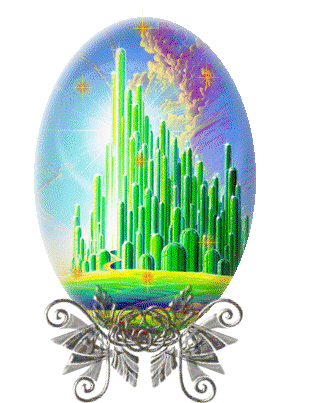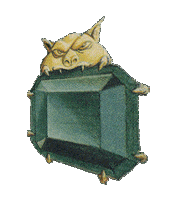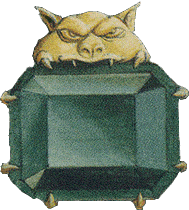
The Brothers' War Showdown
Seattle-Tacoma Area Old School Magic Summer 2019 Meetup
June 22, 4PM, TeKu Tavern
Rules Publication Date: June 3, 2019
Conflict rages between the brothers Urza and Mishra, shaking the continent of Terisiare and even the whole of Dominaria to its core. Urza, possessing the powerful Mightstone, has assembled an army of men and machines, while Mishra, wielding the enslaving Weakstone, has opened a portal to Phyrexia and enlisted the aid of the demonlord Gix and his dragon engines to aid his cause. Decades of conflict have sapped the mana from the land and, seeing that the conflict must finally come to a head, the brothers now prepare to deploy their forces in one final, epic battle: The Brothers' War Showdown!
- TLDR
- Main Event Tournament Format
- Team Event Format
- Most Creative Deck Prizes for Theme Decks
- Example Match Reporting Slip
TLDR
- Who: Old School fans, of course! Registration capped at 32. Register by emailing emeraldcitytrolls@gmail.com or responding to one of the Facebook posts about the event. $10 registration fee, payable at the event.
- What: An Old School Magic tournament! The tournament consists of a single-elimination tournament Main Event centered on individual performance, plus a simultaneous Team Event intended for fun and a flavor-based Theme Deck competition.
- When: Saturday, June 22, from 5PM to ??? (expected tournament length is 4-5 hours). Arrive as early as 4PM. This is the Saturday of the 2019 Seattle MagicFest.
- Where: TeKu Tavern, 552 Denny Way, Seattle, WA 98109.
- Why: For fun, adventure, prizes, and beer! And charity. Everything beyond the cost needed to run the event will go to Mary's Place.
- Cheerio: Following the trend, we will use the London Mulligan at the event.
Main Event Tournament Format
Rules
The Main Event shall be two separate, standard single-elimination Brackets, with 3 games per match. At the completion of each Bracket, the victors from each Bracket will face each other in the Final Championship Match. Rules shall be normal Eternal Central Old School 93-94 rules (http://www.eternalcentral.com/9394rules/), including the London Mulligan , and WITH THE ADDITION THAT GOLGOTHIAN SYLEX IS RESTRICTED. Play those Antiquities cards!
Byes will be distributed as needed to balance each round of the Brackets, being first given based on highest Points Multiplier, then Main Event game win/loss record, then opponent game win/loss record, then randomly. Players with Byes are assumed to have won that match 2-2 via tiebreakers for purposes of determining Player Points and game win/loss records.
The initial tournament Brackets will be constructed based on the Teams, as described below. One Bracket will have all Team Urza players (the Urza Bracket), and the other bracket will have all Team Mishra players (the Mishra Bracket). The champion Urza and Mishra Bracket players will play in the Final Championship Match. The winner of the Final Championship Match earns an additional 10 bonus Team Points (see below) for their team (these are not subject to Point Multipliers and do not count as Player Points).
Deck Construction
All players must choose to have their deck be a Mishra Theme Deck or an Urza Theme Deck and follow the appropriate deck construction limitations. A Mishra Theme Deck may not include cards on the Urza Flavor List and vice versa. A few cards have been designated as belonging on both Flavor Lists; these cards may be in either a Mishra or Urza Theme Deck and do count towards the number of on-Flavor cards a deck includes for purposes of calculating its Point multiplier. Cards have been assigned to a Theme based on the role of the card in the Brothers' War lore, particularly card names and flavor text, and in part in an attempt to encourage brewing and balance the strength of the two Themes (Mishra is inherently a little stronger, as many EC decks would already be Mishra-legal decks). Note that a player may play zero cards from their Theme, and thus may play almost any EC deck they like (note: Mishra's Workshop and Triskelion/Tetravus happen to be on different Flavor Lists and can't go into the same deck).

Entry Fee
Players are expected to provide $10 cash (for event support and charity - extra donations welcome) plus at least one Old School card (alters welcome!) for signing and use in the prize pool.
Judging
This event is casual, for fun, and for charity. It will not have formally trained judges assigned to resolve disputes. First and foremost, players are expected to resolve any disputes between themselves based on mutual respect and good faith.
Any disputes which cannot be resolved in this way will be heard and decided by tournament organizers, who have excellent rules knowledge and real-time access to Gatherer. At least one tournament organizer will be present but not playing in the event to provide a degree of independence in judging.
Should a tournament organizer be involved in a dispute, they will be ineligible to participate in deciding its resolution.
Should a party be unhappy with the resolution of a dispute, they may appeal to a popular vote of all players not involved in the dispute.
Should all else fail, disputes will be resolved randomly, with a high five and/or a hug to follow.
Prizes
The prize for performing well in the Main Event is the order in which you choose cards from the signed card prize pool. The winner of the Final Championship Match will pick first, then the runner-up, and then all other players based on their final position in the Brackets. Ties for final Bracket position will be broken first on membership on the same Team as the Final Championship Match winner, then on highest Points Multiplier, then player game win/loss record, then on opponent win/loss record, and then randomly. This order will be repeated until all cards in the prize pool are chosen.
The winners of the Urza and Mishra Brackets and the winner of the Final Championship Match will receive additional prizes of great entertainment but low financial value.
Additionally, all paid registrants will receive a thematic Door Prize.
Team Event Format
The Main Event is not the only event! The final outcome of The Brothers' War and the very fate of Terisiare are on the line, and just because a mage is defeated in the Main Event does not mean they have nothing left to fight for!
Summary
Players will be divided into two Teams based on the Theme they chose: Team Mishra and Team Urza. Each Team accumulates points for certain games won at the tournament. At the end of the tournament, the Team with the most points wins the Team Prize. Additionally, individual players who win many points will receive additional individual prizes.
Assigning Players to Teams
Players will be divided into two teams based on the Themes they have chosen for their decks. The Teams will likely be of different sizes; that is OK as the tournament structure has been designed to accommodate this.
Player Points and Team Points
Each game played at the event is worth a base level of one point. The winner of a game earns points both for themselves (Player Points) and, if they played an opponent from the other Team, for their team (Team Points). Player Points and Team Points are accumulated over the course of the tournament.
Players eliminated from the Main Event may continue playing each other in additional games. If both players are using the decks they registered for the Main Event, each of their games may count as a Theme Game if they both so choose. Theme Games follow the same rules as games in the Main Event, except:
- The time limit for a Theme Game is 30 minutes, at which point Chaos Orb flips are used to decide the game. Players enforce this time limit on themselves.
- Players may play a single Theme Game, or multiple Theme Games in a row, based on mutual agreement.
- Players may sideboard in any consecutive Theme Games following the first (i.e., you play your first game unsideboarded, and if you want to keep playing you can sideboard).
Once a champion has been declared in the Main Event, no new Theme Games may begin, and those Theme Games that are in progress have 15 minutes to conclude before going to Chaos Orb flips.
Players self-report points they earn by delivering a signed match result sheet to tournament organizers/judges after each match or series of Theme Games they play. As always the honor system is expected.
After all Theme Games end, Player Points and Team Points are tallied. Individual players will be awarded prizes based on the amount of Player Points they accumulated. The Team with the most Team Points is the winning Team. If there is a tie for Team Points, the winning Team is the Team of the player who won the Final Championship Match.
Note: points earned during most of the Main Event, which will only include games between players on the same Team until the Final Championship Match, won't generate Team Points, but will generate Player Points. This is the primary mechanism which allows the Teams to be of different sizes, yet have the point system be fair both to the Teams and individual players.
Points Multipliers
Each player's deck is assigned a Points Multiplier based on the number of cards included in the main deck (NOT sideboard) from their chosen Theme. The number of points a player earns whenever they win a game is always multiplied by their Points Multiplier, both for purposes of calculating Team Points and for Player Points. Multipliers are as follows:
- 0-12 Theme cards: 0x points (you don't earn Player or Team Points)
- 13-24 Theme cards: 1x points
- 25-36 Theme cards: 2x points
- 37-48 Theme cards: 3x points
- 49-59 Theme cards: 4x point
- 60+ Theme cards: 6x points
Note that basic lands are not in either Theme, and decks may include more than 60 cards.
Players should arrive at the event knowing their deck's multiplier, which they will indicate on every match slip they turn in. Deck checks will only be made upon reasonable request, so the honor system is expected as always.
Prizes
The team with the most Team Points wins the Team Event, earning the Team Prize. The Team Prize is a secret, but will be exciting, thematic, and not monetarily significant (i.e., no one is winning a Workshop).
Additionally, the top four Player Points earners from each Team will receive individual prizes. These prizes will range in value from $10-$30 and represent the highest value prizes at the tournament.
Metagamers Note
Metagaming the event by playing a zero Theme card deck with extra artifact hate shall make you the object of scorn and ridicule.
Most Creative Deck Prizes for Theme Decks
Before the Final Championship Match, players will be nominated verbally for Most Creative Urza Deck or Most Creative Mishra Deck by the other players. Players with at least two other players nominating them will have 2 minutes to describe their decklist and make their case why their deck is a great reflection of The Brothers' War lore.
After all such players have had their chance to speak, vote by applause will be used to determine the winner of each Theme Deck Competition. Tournament organizers will judge applause levels subjectively (tournament organizers are not eligible for the Theme Deck competition prizes).
Prizes
The winner of each Most Creative Deck Prize will receive a paperback copy of The Brothers' War by Jeff Grubb, in addition to a special bonus alter courtesy of Anschutz Alters (photo below). And on their deathbed, they will receive total consciousness, which is nice.

Example Match Reporting Slip
A picture is worth a thousand words. Here is what match reporting slips will look like:


